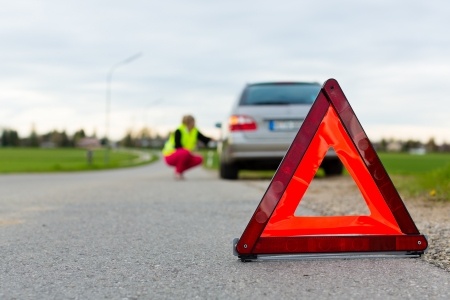What To Do If Your Vehicle Breaks Down
January 6, 2014 | Category: Automobile Accidents | Share "Be Prepared." That's what the American Automobile Association (AAA) says in their brochure, What To Do If your Vehicle Breaks Down.
"Be Prepared." That's what the American Automobile Association (AAA) says in their brochure, What To Do If your Vehicle Breaks Down.
Even when vehicle owners maintain their vehicles on schedule, there may be times when they break down. As much as we would like it, breakdowns do not necessarily happen in one's driveway. Often they happen when one is away from home, at the most inconvenient time. They may also cause a safety issue. AAA says, "Prevention and preparation are the basic ingredients for a great driving experience."
Here are 11 suggestions and guidelines from AAA:
-
Pull off the road - Florida law (316.071) regarding disabled vehicles obstructing traffic states that, "Whenever a vehicle is disabled on any street or highway within the state or for any reason obstructs the regular flow of traffic, the driver shall move the vehicle so as not to obstruct the regular flow of traffic; if he or she cannot move the vehicle alone, solicit help and move the vehicle so as not to obstruct the regular flow of traffic."
-
Note your vehicle's location - Knowing where you are is important when seeking assistance. AAA recommends noticing landmarks and being aware of major roads and cross streets.
-
Assess your vehicle's operating problem - Be aware of your vehicle's warning signs such as steering problems, and listen for unusual noises.
-
Alert other motorists - Use flashers, put hoods up and use flares or warning triangles.
-
Communicate your situation - As soon as you and your passengers are safe, call for assistance.
-
Remain with your vehicle - If you choose to exit the vehicle, do so safely and well away from oncoming traffic and your vehicle. If possible, you and any passengers should exit through the side of the vehicle facing away from the road.
-
What to expect from emergency road service - Emergency road service can provide gas, batteries and towing. [The Florida Department of Transportation provides the Road Ranger program which is a free service. To access this service dial *347 (FHP)]
-
Determine what to tell the emergency road service operator or repair garage.
-
Determine how long you have to wait.
-
What to do when help arrives - Reputable firms have trained personnel who understand what to do in most situations. It’s important to remain calm and cooperative.
-
Know your rights and responsibilities.
Safety should always be the number one concern when a vehicle is disabled. Sadly, in September 2013 News4 in Jacksonville, FL reported that two National Guardsman were killed when they stopped to assist a motorist with a disabled vehicle.
"The AAA brochure, What To Do If Your Vehicle Breaks Down, is a good source of information for motorists. Please click on the link above and keep a copy of this brochure in your glove compartment. You never know when you may need it," recommends Attorney Randall Spivey of Spivey Law Firm, Personal Injury Attorneys, P.A.
Florida Accident Attorney, Randall L. Spivey is a Board Certified Trial Attorney – the highest recognition for competence bestowed by the Florida Bar and a distinction earned by just one (1%) percent of Florida attorneys. He has handled over 2,000 personal injury and wrongful death cases throughout Florida. For a free and confidential consultation to discuss your legal rights, contact the Spivey Law Firm, Personal Injury Attorneys, P.A., in Lee County at 239.337.7483 or toll free at 1.888.477.4839,or by email to Randall@SpiveyLaw.com. Visit SpiveyLaw.com for more information. You can contact Spivey Law Firm, Personal Injury Attorneys, P.A.in Charlotte County at 941.764.7748 and in Collier County 239.793.7748.

